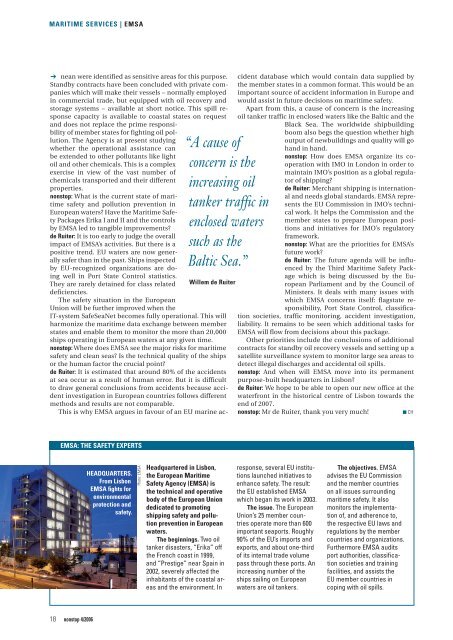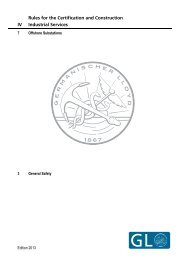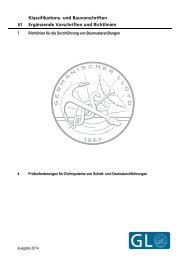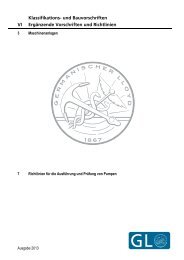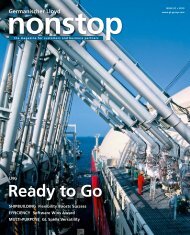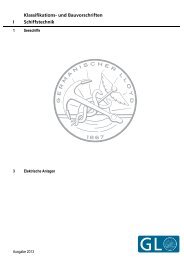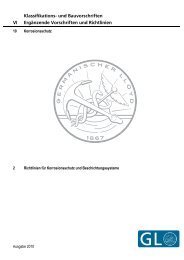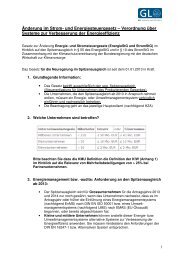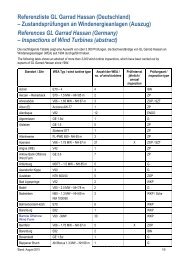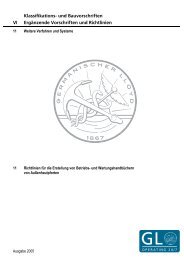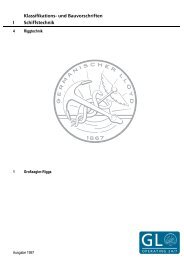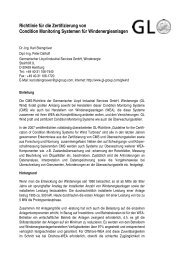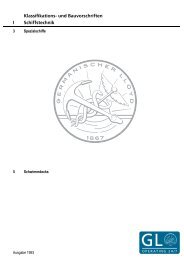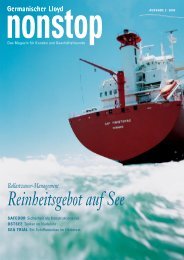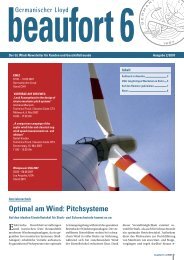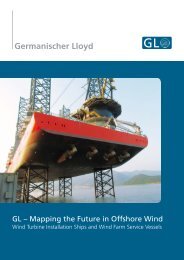Protection of Fuel Tanks Safety ahead! - GL Group
Protection of Fuel Tanks Safety ahead! - GL Group
Protection of Fuel Tanks Safety ahead! - GL Group
Create successful ePaper yourself
Turn your PDF publications into a flip-book with our unique Google optimized e-Paper software.
MARITIME SERVICES | EMSA<br />
nean were identified as sensitive areas for this purpose.<br />
Standby contracts have been concluded with private companies<br />
which will make their vessels – normally employed<br />
in commercial trade, but equipped with oil recovery and<br />
storage systems – available at short notice. This spill response<br />
capacity is available to coastal states on request<br />
and does not replace the prime responsibility<br />
<strong>of</strong> member states for fighting oil pol-<br />
lution. The Agency is at present studying<br />
whether the operational assistance can<br />
be extended to other pollutants like light<br />
oil and other chemicals. This is a complex<br />
exercise in view <strong>of</strong> the vast number <strong>of</strong><br />
chemicals transported and their different<br />
properties.<br />
nonstop: What is the current state <strong>of</strong> maritime<br />
safety and pollution prevention in<br />
European waters? Have the Maritime <strong>Safety</strong><br />
Packages Erika I and II and the controls<br />
by EMSA led to tangible improvements?<br />
de Ruiter: It is too early to judge the overall<br />
impact <strong>of</strong> EMSA’s activities. But there is a<br />
positive trend. EU waters are now generally<br />
safer than in the past. Ships inspected<br />
by EU-recognized organizations are doing<br />
well in Port State Control statistics.<br />
They are rarely detained for class related Willem de Ruiter<br />
deficiencies.<br />
The safety situation in the European<br />
Union will be further improved when the<br />
IT-system SafeSeaNet becomes fully operational. This will<br />
harmonize the maritime data exchange between member<br />
states and enable them to monitor the more than 20,000<br />
ships operating in European waters at any given time.<br />
nonstop: Where does EMSA see the major risks for maritime<br />
safety and clean seas? Is the technical quality <strong>of</strong> the ships<br />
or the human factor the crucial point?<br />
de Ruiter: It is estimated that around 80% <strong>of</strong> the accidents<br />
at sea occur as a result <strong>of</strong> human error. But it is difficult<br />
to draw general conclusions from accidents because accident<br />
investigation in European countries follows different<br />
methods and results are not comparable.<br />
This is why EMSA argues in favour <strong>of</strong> an EU marine ac-<br />
EMSA: THE SAFETY EXPERTS<br />
18 nonstop 4/2006<br />
HEADQUARTERS.<br />
From Lisbon<br />
EMSA fi ghts for<br />
environmental<br />
protection and<br />
safety.<br />
Photo: EMSA<br />
“A cause <strong>of</strong><br />
concern is the<br />
increasing oil<br />
tanker traffi c in<br />
enclosed waters<br />
such as the<br />
Baltic Sea.”<br />
Headquartered in Lisbon,<br />
the European Maritime<br />
<strong>Safety</strong> Agency (EMSA) is<br />
the technical and operative<br />
body <strong>of</strong> the European Union<br />
dedicated to promoting<br />
shipping safety and pollution<br />
prevention in European<br />
waters.<br />
The beginnings. Two oil<br />
tanker disasters, “Erika” <strong>of</strong>f<br />
the French coast in 1999,<br />
and “Prestige” near Spain in<br />
2002, severely affected the<br />
inhabitants <strong>of</strong> the coastal areas<br />
and the environment. In<br />
cident database which would contain data supplied by<br />
the member states in a common format. This would be an<br />
important source <strong>of</strong> accident information in Europe and<br />
would assist in future decisions on maritime safety.<br />
Apart from this, a cause <strong>of</strong> concern is the increasing<br />
oil tanker traffic in enclosed waters like the Baltic and the<br />
Black Sea. The worldwide shipbuilding<br />
boom also begs the question whether high<br />
output <strong>of</strong> newbuildings and quality will go<br />
hand in hand.<br />
nonstop: How does EMSA organize its cooperation<br />
with IMO in London in order to<br />
maintain IMO’s position as a global regulator<br />
<strong>of</strong> shipping?<br />
de Ruiter: Merchant shipping is international<br />
and needs global standards. EMSA represents<br />
the EU Commission in IMO’s technical<br />
work. It helps the Commission and the<br />
member states to prepare European positions<br />
and initiatives for IMO’s regulatory<br />
framework.<br />
nonstop: What are the priorities for EMSA’s<br />
future work?<br />
de Ruiter: The future agenda will be influenced<br />
by the Third Maritime <strong>Safety</strong> Package<br />
which is being discussed by the European<br />
Parliament and by the Council <strong>of</strong><br />
Ministers. It deals with many issues with<br />
which EMSA concerns itself: flagstate responsibility,<br />
Port State Control, classification<br />
societies, traffic monitoring, accident investigation,<br />
liability. It remains to be seen which additional tasks for<br />
EMSA will flow from decisions about this package.<br />
Other priorities include the conclusions <strong>of</strong> additional<br />
contracts for standby oil recovery vessels and setting up a<br />
satellite surveillance system to monitor large sea areas to<br />
detect illegal discharges and accidental oil spills.<br />
nonstop: And when will EMSA move into its permanent<br />
purpose-built headquarters in Lisbon?<br />
de Ruiter: We hope to be able to open our new <strong>of</strong>fice at the<br />
waterfront in the historical centre <strong>of</strong> Lisbon towards the<br />
end <strong>of</strong> 2007.<br />
nonstop: Mr de Ruiter, thank you very much! ■ CH<br />
response, several EU institutions<br />
launched initiatives to<br />
enhance safety. The result:<br />
the EU established EMSA<br />
which began its work in 2003.<br />
The issue. The European<br />
Union’s 25 member countries<br />
operate more than 600<br />
important seaports. Roughly<br />
90% <strong>of</strong> the EU’s imports and<br />
exports, and about one-third<br />
<strong>of</strong> its internal trade volume<br />
pass through these ports. An<br />
increasing number <strong>of</strong> the<br />
ships sailing on European<br />
waters are oil tankers.<br />
The objectives. EMSA<br />
advises the EU Commission<br />
and the member countries<br />
on all issues surrounding<br />
maritime safety. It also<br />
monitors the implementation<br />
<strong>of</strong>, and adherence to,<br />
the respective EU laws and<br />
regulations by the member<br />
countries and organizations.<br />
Furthermore EMSA audits<br />
port authorities, classifi cation<br />
societies and training<br />
facilities, and assists the<br />
EU member countries in<br />
coping with oil spills.


